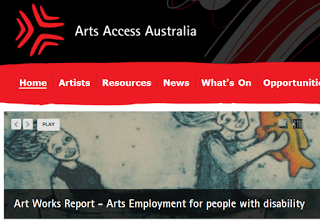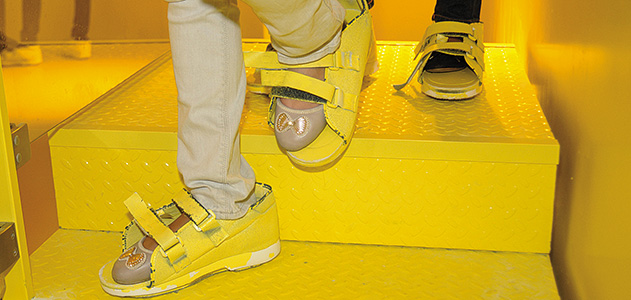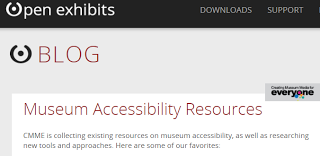
With more and more museums pushing content to personal digital devices, we need to remember who we may be leaving out. When Phil and I talk about the digital divide, we are usually thinking of an economic barrier—the shrinking (but significant) portion of society that does not have access to mobile technology, particularly smart mobile technology. But apps and other digital content can pose accessibility challenges as well. Museums have a mixed record on making even their websites meet accessibility standards—often unintentionally throwing up a “digital glass wall” that hinders access. How will we fare with the myriad content being developed for apps, podcasts, etc? For this reason, we’ve kept our eyes open for news related to universal design and digital devices, as well as our ongoing scanning on accessibility in general.
For example, people and organizations advocating for cultural accessibility, like:
- Pesky People, a UK-based group that, among other campaigns, advocates for the cultural sector to subtitle their video content.
- Arts Access Australia is that country’s leading advocacy group for arts and disability, with an extensive resource list.
- The US-based Autism in the Museum, which is a “clearinghouse of best practices, models, ideas, resources and research about making museums … welcoming and inclusive for people with autism and their families.”
- The Tucson Association of Museums, which maintains a convenient listof agencies, information and products for the visually impaired.
- We also like the Museum for All blog–“an initiative to open museums for all publics.”
Museums making notable efforts to create accessible exhibits, such as:
 |
|
Israel Children’s Museum exhibit “Dialogue With Time”:
visitors strap onheavy shoes to experience what it feels like for the
elderly to climb a flightof stairs.(Israel Children’s Museum)
|
- Comprehensive efforts by the Boston Museum of Science to incorporate the principles of Universal Design into their work.
- The Israeli Children’s Museum working to increase empathy for the limitations that come with aging.
- The Royal Ontario Museum including lots of touchable casts in Maya: Secrets of Their Ancient World.
- The Manchester Museum pioneering the use of haptic technology in their galleries.
- The nine other UK museums associated with Rethinking Disability Representation in Museums and Galleries, a research initiative based at the University of Leicester.
Digital devices and tools related to accessibility, like:
- BrailleTouch, which makes it easier for users who know Braille to send text messages
- Hearing Loops that connect anyone with a hearing aid or cochlear implant to a building’s sound system
- OpenDyslexic, a free font that helps people with dyslexia read online
Guidelines or resources on digital accessibility, such as the:
- Dyslexia Style Guide for writing and web design.
- DeafSpace Guidelines produced by Gallaudet University.
- Recent report from the Accessible Technologies in Museums research group at Spain’s Carlos III University about their international survey of museum professionals on accessibility.
- Disability Meets Digital Unconference in Manchester, UK, on Thursday, March 21 (if you go, please volunteer to write a guest post about it for CFM).
- W3C Guidelines for web accessibility.
Plus some resources on physicalaccessibility in museums, including:
- A growing list of resources from Creating Museum Media for Everyone.
- This Malaysian research paper on Integrating Elderly Pathway Design into Museum Space Planning (not as obscure as it sounds, and applicable to other kinds of mobility restrictions as well).
Finally, for a more scholarly and theoretical approach, Helen Rees Leahy’s book, Museum Bodies: The Politics and Practices of Visiting and Viewing (Ashgate, 2012) offers some historical perspective on how museums have accommodated or excluded people with disabilities. H-Disability is an academic discussion list devoted to disability studies, including reviews of the emerging scholarship on disability and museums.
Please help us keep our museums & accessibility resource list up-to-date by sharing links to articles, websites and other resources in the comments section below. Thank you!











Thanks so much for mentioning http://www.autisminthemuseum.org. The site is a new undertaking, and I would be grateful for any suggestions, additions, or ideas for improvement. As I'm a consultant/writer (and not a museum staff member), the site isn't connected with any institution, though I'm open to potential partnerships. Lisa Jo Rudy (www.lisajorudy.com)
Thanks for the roundup without tears and too much text.
The Best Porn Star Sunny leone Hot news and hot Pictures, Sunne Leone Porn Pictures and Videos
hotentertainnews.blogspot.com